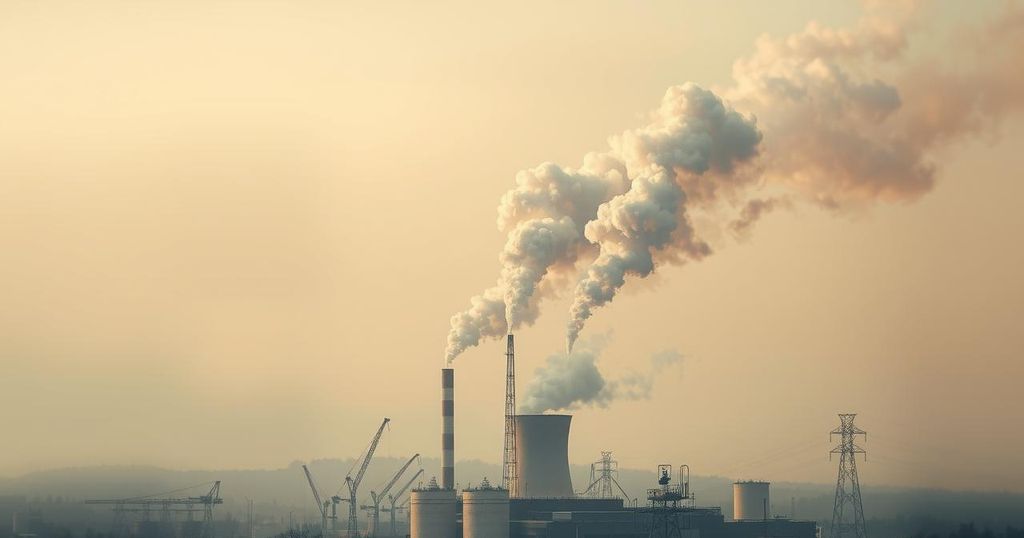The 2024 World Air Quality Report presents a significant pollution crisis in Africa, highlighting Ghana, Nigeria, Chad, and Rwanda among the world’s most polluted nations. Chad tops the list with PM2.5 levels nearly 18 times the WHO limit, while Ghana ranks 14th with a level of 35.8 µg/m³. Serious health implications arise as air pollution continues to escalate, necessitating urgent governmental action to improve air quality and protect public health.
The 2024 World Air Quality Report underscores significant pollution issues across Africa, with Ghana, Nigeria, Chad, and Rwanda ranking among the most polluted nations globally. The report paints a dire picture of deteriorating air quality, posing health risks for millions. Notably, Chad leads the list with a staggering PM2.5 concentration of 91.8 µg/m³, considerably higher than the World Health Organization’s (WHO) recommended limit of 5 µg/m³.
In the rankings, Nigeria and Rwanda follow closely, with PM2.5 levels of 40.1 µg/m³ and 40.8 µg/m³ respectively, while Ghana ranks 14th with a recorded level of 35.8 µg/m³. PM2.5 particles are extremely hazardous, capable of penetrating deep into the lungs and bloodstream, leading to severe health conditions. Furthermore, air pollution has been recorded to decrease life expectancy in heavily affected areas by an average of 2.7 years.
The situation in Ghana is especially concerning, with pollution levels now reported to be seven times above the WHO limit, placing Accra as the 16th most polluted capital city with 36.3 µg/m³. Kumasi, newly highlighted in this report, surpassed Accra with a pollution level of 39.5 µg/m³. Ghana has experienced a significant rise in pollution, moving from the 27th rank in 2022 to 14th in 2024, reflecting a troubling trend.
Africa faces severe air pollution challenges, with five out of the ten most polluted countries located on the continent. Limited monitoring infrastructure has exacerbated these air quality issues, with only 24 of the 54 nations reporting sufficient data. Moreover, significant gaps in data collection within major urban areas, such as Lagos, hinder a comprehensive understanding of the crisis.
The public health implications of air pollution in Ghana are grave. The WHO estimates that 28,000 Ghanaians die annually due to air pollution, equating to a death every 19 minutes. There is an urgent need for action, as the ongoing increase in PM2.5 levels can lead to at least 2,333 additional deaths each month if unaddressed. Economic projections indicate that the urban air pollution crisis could cost Ghana’s economy around $137.8 billion by the year 2040.
On a comparative scale, while a mere 17% of cities globally adhere to the WHO air pollution standards, several regions have successfully maintained cleaner air quality. In 2024, Chad, Bangladesh, and Pakistan emerged as the most polluted countries, while Australia, New Zealand, and several other nations excelled in maintaining cleaner environments.
The driving factors of Africa’s worsening air quality include rapid urbanization, increasing population density, industrial emissions, and improper waste management practices. The report emphasizes that non-governmental organizations are now contributing significantly to air quality data collection, suggesting an urgent requirement for enhanced government-led air monitoring initiatives.
As the air quality in Ghana continues to decline, there is an imperative for the government to implement stricter environmental regulations. Experts advocate for enhanced vehicle emission standards, investment in renewable energy, increased air quality monitoring stations, and strict policies against waste burning to mitigate this public health crisis. Immediate action is crucial to avert a deadly future and improve the air quality for millions of Ghanaians.
The 2024 World Air Quality Report reveals alarming air pollution levels in Africa, particularly in Ghana, Nigeria, Chad, and Rwanda. The findings emphasize a growing public health emergency, with significant mortality rates associated with air quality. Urgent measures are necessary to address this crisis, including stricter environmental regulations and improved monitoring to combat pollution effectively. Immediate policy action is pivotal to safeguard the health and well-being of millions affected by this silent killer.
Original Source: www.myjoyonline.com






